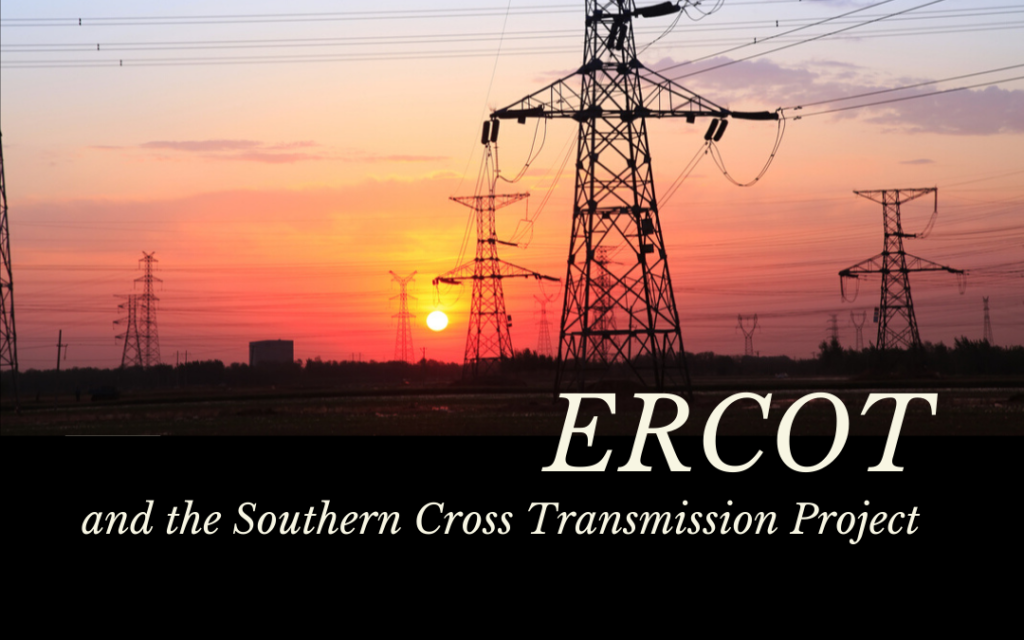__________
The Southern Cross project raises a number of difficult technical issues for engineers at the Electric Reliability Council of Texas.
_____________
 AUSTIN – In recent years, ERCOT, the PUC, and market participants have devoted much attention to what is known as the Southern Cross Transmission Project. Southern Cross is a novel kind of project in the United States, in that it seeks to create a direct-current (DC) transmission link between ERCOT and the Southeastern United States using a transmission line through Louisiana and Mississippi. The idea behind the project is that a high-capacity DC line joining the two grids will allow excess ERCOT wind power to be sold into Eastern U.S. energy markets, and also will allow imports into Texas at other times.
AUSTIN – In recent years, ERCOT, the PUC, and market participants have devoted much attention to what is known as the Southern Cross Transmission Project. Southern Cross is a novel kind of project in the United States, in that it seeks to create a direct-current (DC) transmission link between ERCOT and the Southeastern United States using a transmission line through Louisiana and Mississippi. The idea behind the project is that a high-capacity DC line joining the two grids will allow excess ERCOT wind power to be sold into Eastern U.S. energy markets, and also will allow imports into Texas at other times.
The fact that the line will be operating at direct current — instead of alternating current — means that under Federal law, ERCOT would not be considered “connected” to the Eastern US system from an electrical perspective. This will mean that ERCOT’s jurisdictional status will be unchanged, and instead of answering to the Federal Energy Regulatory Commission in Washington DC, ERCOT will continue to be regulated by the Texas Public Utility Commission.

Chris Brewster
The Southern Cross Project raises a number of technical issues for ERCOT, however. Some of those issues have already been addressed by the PUC, but the Commission also has assigned many of those issues for study and recommendation by ERCOT. One such issue was put before stakeholders over January and February of this year.
At issue is whether a DC tie to another grid should be subject to dispatch by ERCOT’s computer system that matches energy production with demand — known as SCED, or Security-Constrained Economic Dispatch. SCED is the central element of the nodal wholesale market, and it is intended to select the lowest-cost mix of generation resources that can meet customers’ demand, consistent with reliability considerations and the state of the transmission grid. (For more about SCED, see the article here.)
In January and February, ERCOT reported that DC ties cannot be integrated into SCED. That is, the process of selecting the lowest-cost mix of resources cannot accommodate DC ties. At the February Board meeting, ERCOT staff explained that incorporating DC ties into SCED was prohibitively complex and would be too expensive, and that ERCOT has existing tools to manage the congestion resulting from the flow of power through a DC tie.
At the February Board meeting, consumers raised questions about this conclusion, noting that SCED was our market’s means of addressing reliability concerns on a lowest-cost basis, and keeping DC ties out of SCED will affect cost and reliability. Consumers urged that, even if ERCOT staff finds that including DC ties in SCED now is not feasible, the issue should continue to be studied. Other board members expressed sympathy for these views, but were also understanding of ERCOT staff’s judgment regarding the technical feasibility of including DC ties in SCED.
Chris Brewster, an attorney with Lloyd Gosselink, participates in ERCOT matters on behalf of municipalities.

